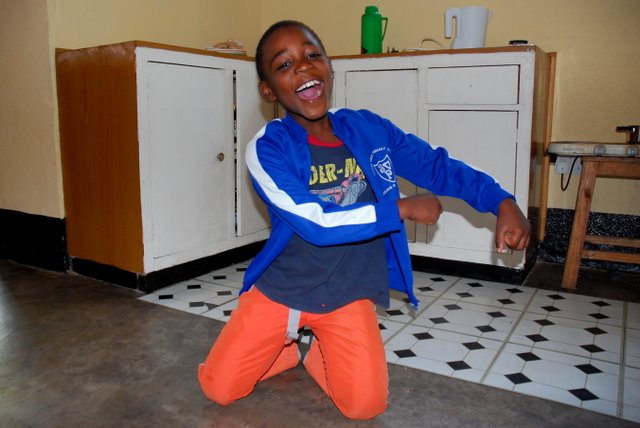Hold on, who am I kidding? I hardly live alone. There’s the friendly wildlife that share my abode — the tiny ants that crawl in through the kitchen window, the cockroaches that scuttle across the concrete floor, the crafty mosquitoes that make it inside my bed net, the agile lizards that sashay along the walls and hide behind the bathroom mirror. And there are the three flea-bitten “guard” dogs that root through the trash and have finally stopped barking when I enter the compound. But my steadiest companion has been Nigel, my eight-year-old neighbor.

Nigel lives in the guesthouse adjoining mine with his 11-year-old sister Panashe and their mother, a nurse. His father works in Lilongwe, four hours to the north. Nigel’s family has been in Malawi since April, when they left Zimbabwe.
Nigel doesn’t talk much, but when he does, he precedes each statement with a lengthy, well-considered pause. When I ask him why his family left Zimbabwe, he falls silent and thinks for a long time. Standard practice.
“Because people were killing people,” he replies.
“Who was killing whom?”
“People were killing people.”
Such serious conversations are unusual, though. When I first moved in, Nigel would knock on my door, bound in, and drop into one of the frayed easy chairs. He would flash a close-mouthed smile and watch me wordlessly. This made me a bit uneasy. But our relationship made halting progress. We shared candy. I introduced him to the word game Bananagrams. He promised to teach me Shona. We chatted about school — he told me he was number one in his class in Zimbabwe, and as a reward, his friend’s mother gave him a green t-shirt emblazoned with the words “WEST COAST” (I abandoned an attempt to explain where the West Coast is, and that I live on it).
Now I’m comfortable with Nigel’s quiet presence. We sometimes talk and sometimes don’t. He keeps me informed about celebrity news. Madonna, he told me, is in Malawi this week. He practices his kung fu kicks as I prepare tea in the morning, and when I shoo him out so I can shower, he knocks on my door as soon as I’ve switched off the water and laughs at the towel swaddling my wet hair. We have plans to bake cookies together, chocolate-banana, he requested.
And then last Thursday, our relationship took a quantum leap forward. I was getting ready for happy hour at Doogle’s, a bar frequented by tourists, the teenage children of expats, and grizzled South African men nursing bottles of Carlsberg and fumbling with fat wads of Kwachas. Nigel sprang through the open door and gestured at me to listen to his left pants pocket. Michael Jackson chimed out. Nigel produced a cell phone, along with a crumpled tabloid, proclaiming Jackson’s death suicide.
“Nigel, we can do better than that cell phone,” I said.

It was instantly dance party o’clock. James Brown, Kool & The Gang, Tower of Power. My laptop speakers were tinny and we lacked a disco ball or flashing lights, but Nigel and I let loose. I sidestepped around the kitchen, and Nigel whipped out punching moves that would have made Richard Simmons proud. I tried introducing him to Journey, which met little success, but “Boom Boom Pow” and “Get Busy” received resounding approval. He disliked the Macarena but vowed to teach the Electric Slide to his sister.

Yet Nigel wanted the King of Pop back.
“Out of luck,” I said, scrolling through my music library. “Wait! Jackson 5!” I hit “ABC” and cranked the volume. “That’s Michael Jackson when he was a kid,” I told Nigel. “Maybe when he was your age.”
Nigel considered this. He looked to one side and then the other. He moved his lips without producing sound. I waited, as has become my custom.
Then he spoke.
“Back when he was brown?” Nigel asked.
Yes, Nigel, back when he was brown.









